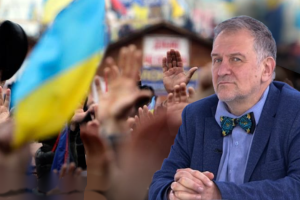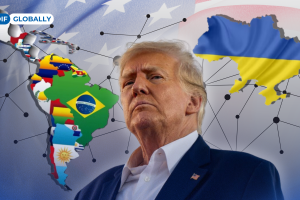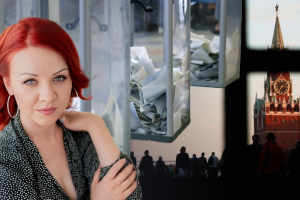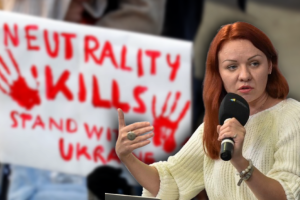Ukraine’s Victory. Brief #2
Domestic Situation
Despite Ukrainian Parliament’s efforts to go forward with adopting the legislation crucial for the future EU membership negotiations (Laws on media, appointing of the members of the Constitutional Court of Ukraine and national minorities), Brussels warned that mere adoption of the said laws does not guarantee the official start of negotiations.
International Developments
Visit of Ukrainian President Zelenskyy to Washington appeared to be major political move, as it (1) allowed to negotiate details of the Just Peace initiative on the highest level with President Biden; (2) further consolidated bipartisan support for Ukraine in the US Congress; (3) sent other Western allies clear message to increase support of Ukraine; (4) clearly demonstrated the shift in security situation in Ukraine due to Western weapons and battlefield successes of Ukrainian Army. It also marked a new phase of providing military aid to Ukraine with US decision to deploy Patriot missiles as a part of a $1.8 billion Ukraine security assistance package and a wider $45 billion 2023 assistance approved by Congress.
Russia’s Putin visited his Belarus counterpart Lukashenko in an attempt to once again push Minsk to provide its land forces to support Russian war efforts against Ukraine. So far these attempts proved fruitless, as Belarus dictator seems to efficiently exploit Kremlin anti-NATO propaganda narratives to safeguard his military from taking direct part in the aggressive war against Ukraine. However, the so-called “regional group of forces”, joint Russian-Belarus military effort established early October, 2022, could potentially be utilized against Ukraine either as a diversion tool in the Kremlin hybrid playbook or as an actual strike force be Moscow sure it can achieve at least tactical success.
Russia continues to use food as weapon by 17-fold increase the amount of stolen Ukrainian grain it transports from the occupied Ukrainian Crimea to Syria, trying to financially boost its Syrian ally Assad Jr., possibly setting stage with Iran for further escalation in the region.
War/Security Situation
Russian army continues to imply terror tactics by trying to purposefully hit civilian/critical infrastructure in Ukraine. Moscow seems to be on the way to negotiate a further arms deal with Iran, viewing the latter as a source of kamikaze drones (with their supplies draining due to active use by Russian forces) and 300 to 700 km range ballistic missiles. Russia’s renowned utilization of “Shakheed” drones (as in night strike on Kyiv and Southern regions of Ukraine, 19.12) indicates the deal has already being settled.
Russia is desperately looking for ammunition supplies as its production potential falls far behind the battlefield demand, this time reaching to North Korea for missiles to Russian “Wagner” PMC.
Russian military actively shell Kherson, indiscriminately hitting civilian targets and purposefully inflicting massive damage and civilian life losses in a weak attempt to compensate for loosing control of the city to the Armed Froces of Ukraine a little more then month ago.
Recommendations
1. Western allies should follow the line set by Ukrainian President Zelenskyy’s visit to Washington and his negotiations with the US President Biden in terms of intensifying the military assistance to Ukraine. The US decision to provide official Kyiv with Patriot systems (along with strong comments that Russia has no word in the US decisions as to what military aid it sends to Ukraine) marks the new phase of providing more sophisticated and capable weapons systems to ensure Ukrainian ultimate victory on the battlefield as a basis for diplomatic resolution of the war.
2. Ukrainian legislative and executive powers should pay much more than a formal heed to legal and practical mechanisms being installed as part of the future EU member recommendations, as Brussels points out on qualitative priorities over the formal side of the matter.
3. Belarus remains a crucial factor in the Kremlin war calculations as Russian leader continues his pressure on Lukashenko to be directly involved in the war against Ukraine. Despite these fruitless efforts so far, Belarus threat plays well into the Kremlin hybrid playbook by (1) forcing Ukrainian forces to keep battle-ready reserves along the Northern borders and (2) putting additional pressure and escalation threat on Poland and Baltic states and with them, on NATO. Western allies should pay more attention to the growing hybrid threat from Minsk.
4. Western nations should pay heed to growing Moscow-Tehran ties and deteriorate any possible military alliance between the two, as it could potentially create tensions and threats to security not only in Euroatlantic but Middleeastern region as well, partnering with Israel and other interested parties to disrupt any potential Russian-Iranian war efforts.
_______________________
This policy brief was prepared as part of a project “Russia-Ukraine Conflict: from Full-Scale War to Conflict Resolution and Post-War Reconstruction” implemented in cooperation with the Razumkov Centre with the support of the MATRA program of the Embassy of the Netherlands. The opinions expressed are those of the author(s) only and should not be considered as representative of the Embassy’s official position.








